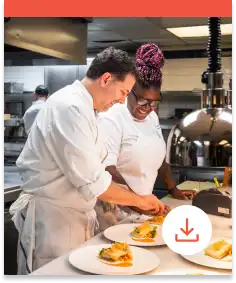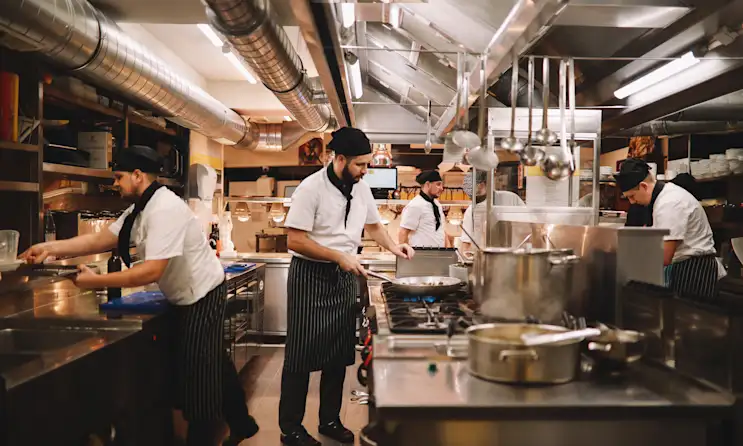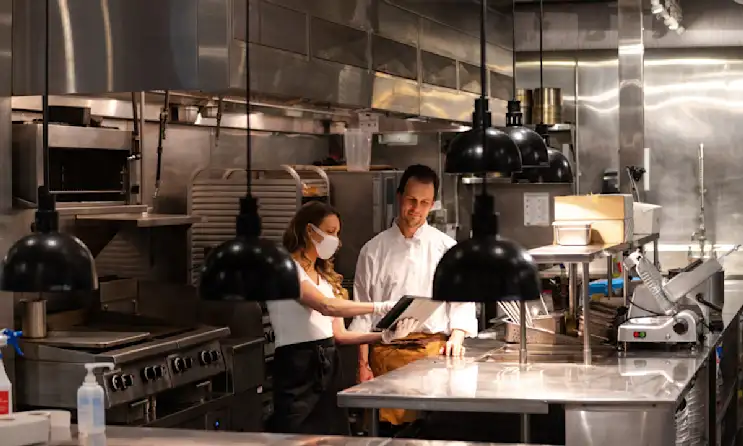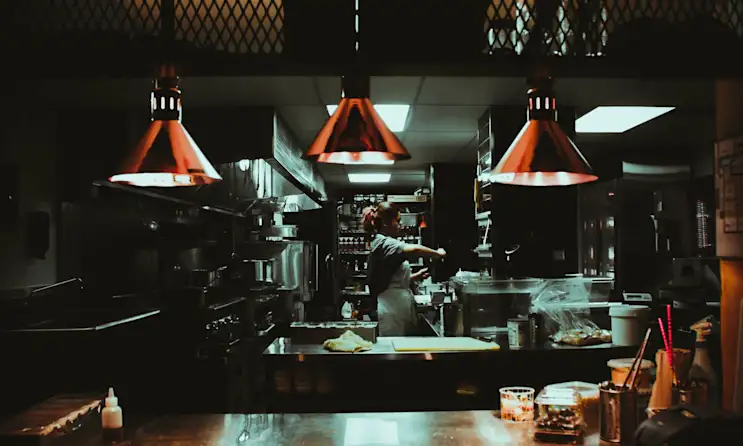Staffing
How to Answer (and Ask) Restaurant Interview Questions
October 9, 2023
Whether you’re a job applicant or someone hiring, here’s your guide to interviewing.
The restaurant worker shortage may have peaked in 2021, when 75% of restaurateurs said hiring and retention was their top business challenge, but it still remains a serious issue across the industry. It's hard enough for restaurants to get one applicant through the doors for an interview, much less hire the best applicant for each opening.
But hiring the wrong person is costly. Between the dip in productivity, resources spent filling the role, and time required to onboard, it costs nearly $6,000 to backfill a worker. That’s why it’s crucial to hire candidates who are good fits for your restaurant.
One of the best ways to separate true hospitality champs from those who might be a poor match is with restaurant interview questions. The right interview questions allow strong candidates to share their experience while also giving a hiring panel the confidence they need to make a hire.

RESOURCE
The New Front of House
How restaurant technology is transforming the guest experience.
12 Restaurant Interview Questions
Whether you’re a job seeker or a hiring manager, here are interview questions to be familiar with along with suggested answers and what to look out for in a response.
Interview Questions for Restaurant Managers
1. It’s your busiest shift, and two of your employees don’t show up. What do you do?
JOB APPLICANTS
How to Answer: Here’s your chance to highlight your ability to be nimble and show how you can pivot when things (inevitably) go wrong. It’s also a way to demonstrate your leadership style when it comes to discipline and team management. Try to strike a balance between understanding that mistakes happen — for example, people mix up their shifts or write down the time incorrectly — and holding people accountable. It’s important to remind your staff how their actions impact other team members and the customer experience.
Example Answer: “Clear communication with my employees from day one is essential, and when my staff can’t make it into a shift, I expect them to let me know. I like to maintain an on-call list when I’m scheduling shifts to have backups in place. If I’ve exhausted that list with no success, I’ll step in to cover responsibilities during the shift. My job is to also keep morale up with my staff who did show up and may be feeling stretched thin. In terms of addressing the issue with the no-show employee, I would contact them to find out what happened. If they simply blew off the shift (and they have a history of unreliability), then termination may be appropriate. Obviously, extenuating circumstances that we cannot control may have taken place, so meeting those situations with compassion is key.”
HIRING MANAGERS
What to Look For: Staffing issues are inevitable, and managers must be quick on their feet to ensure they don’t disrupt the guest experience. This question allows them to show how they would address no-shows and provides a glimpse at their leadership style. Applicants for manager-level roles should either have experience navigating this issue or experience helping their own manager navigate it.
Red Flags: Be wary of applicants who downplay the issue and make it sound too easy to manage. Also pay attention to how they would handle the employees who didn't show up. If they seem like they would rule with an iron fist — or be too timid and non-confrontational — it may not fit with your team culture.
2. How would you react if you were told that your team wasn’t hitting their food & beverage sales numbers?
JOB APPLICANTS
How to Answer: Approach this question with curiosity, and dig into WHY the numbers aren’t being achieved. Getting to the root of the issue not only helps you craft your answer but also helps you handle this situation in real life.
Example Answer: “I’d start by asking a few questions to better understand where the gaps are coming from. Are certain menu items underperforming? Is the team trained on upselling? Do we need to increase the number of customers we’re serving? My approach will depend on what I uncover. If particular dishes aren’t selling super well, I’d consider experimenting with promotions and specials to see if we can move the needle there. Setting up monthly training sessions on upselling with my team to keep us sharp and experienced on the practice might be another avenue to consider. If we need to drive more orders, I’d look at things like optimizing menu item descriptions and adding new or updated food photography to our online ordering page.”
HIRING MANAGERS
What to Look For: A good response should demonstrate the ability to solve complex problems. The applicant should know that this question is hard to answer without more information, and their thought process should begin by asking questions. In particular, they should start by asking where they missed their numbers, which is the first step to determining why they missed their numbers. From there, they can start to answer how they would address the issues. It would be great if they added an example, but even walking through a process like that is a good sign.
Red Flags: It's an issue if your candidate responds with a “blanket answer” — something that doesn't suggest they want more information. For example, if they say they would call a staff meeting, tell everyone performance is struggling and give them a pep talk, it's a sign they're not ready for a leadership role. Certain issues might call for a solution like that, but you can't solve inventory issues with a pep talk. Look for candidates to demonstrate experience, or at the very least, a sharp problem-solving instinct.
3. Your #1 employee says they’re considering another opportunity. How do you respond?
JOB APPLICANTS
How to Answer: Talk through your strategy for keeping this particular employee but also share your wider thoughts on employee retention. People leave jobs for a variety of reasons: a better work-life balance, a more supportive environment, more pay, better benefits. Understanding (and tracking) why your employees are leaving can help you make changes that can retain them.
Example Answer: “I would ask this employee what’s making them consider the other opportunity. If it’s the pay, I’d look into increasing their pay to exceed the other offer. If it’s my management style, I would ask for feedback on where I can improve to better support them. I’d also use the moment to assess overall satisfaction on my team. It’s a good reminder that evaluating competitive pay and advancement opportunities on a periodic basis can help create lower turnover.”
HIRING MANAGERS
What to Look For: A good answer should explain how the candidate would persuade this employee to stay — but it should also note the importance of applying what they learned to prevent other employees from leaving.
Red Flags: A bad answer to this question jumps to solutions before seeking to understand the problem. It’s also a bad sign if the applicant doesn't mention future employee retention. If they treat one employee leaving as a one-employee issue — rather than a catalyst that could cause other employees to leave, or a chance for self-improvement — it suggests they don't see the full picture.

RESOURCE
The State of the Restaurant Workforce
Learn how the worker shortage is evolving and how restaurant owners can navigate it.
Interview Questions for Restaurant Servers & Bartenders
1. Tell me about a time when you delighted a customer.
JOB APPLICANTS
How to Answer: A memorable restaurant experience leads to repeat diners and ultimately drives more revenue, so knowing how to create an unforgettable time is a key skill to have. Show how you’re proactive in delivering great customer service with specific details.
Example Answer: “In my previous position, I built a relationship with this one couple that used to come in all the time. I knew details about their family and lives, and of course their favorite types of food and drink — which helped me recommend things I thought they would like. I work to incorporate this level of hospitality into my work every day.”
HIRING MANAGERS
What to Look For: Experienced front-of-house candidates should have multiple stories like this at the ready. Pay attention, too, to how they tell it. People have different communication styles, but you need to at least detect some degree of passion and excitement for delighting guests.
Red Flags: If they struggle to recall a time they delighted a customer — or only times they met expectations — that's an issue. Make sure their answer touches on things they did to delight guests. If the story is all about how much a guest loved his food, it's really the kitchen who delighted them.
2. How would you manage a customer who can’t be served more alcohol? Walk me through what you'd say.
JOB APPLICANTS
How to Answer: This question is not just asking you about handling inebriated customers. It’s trying to determine how much experience you have in the sticky situations this business entails, and how well you’re able to leverage that past experience into a resolution.
Example Answer: “Navigating a situation like this can be tricky, but here’s what’s worked for me in the past. I keep the conversation light and friendly and offer the customer a water. My goal is to be polite and stay calm but also show authority. I usually say something along the lines of ‘I’d like to see you drink this water and then we’ll talk about another drink.’ I try to keep it low-key to minimize embarrassment. If things escalate, I’ll consult with my manager to see if they need to step in.”
HIRING MANAGERS
What to Look For: This a test to see how the candidate would handle one of the hardest parts of their job: hospitably telling a customer something they don't want to hear. Pay attention to how they balance confidence and professionalism with empathy and friendliness. A top applicant should be able to accomplish both.
Red Flags: A good answer to this question is all about balance. If the applicant says they would simply "lay down the law," they may be more bluster than experience. If the applicant looks uncomfortable and says they’ll ask the customer to stop ordering drinks — rather than telling them they can't — they may not be fit to maintain decorum in your dining room.
3. A customer is not happy about their order. How do you handle?
JOB APPLICANTS
How to Answer: Explaining how you will connect with the customer is crucial here — after all, everyone wants to feel heard. Talk about how you’ll own the mistake and share steps to correct the problem.
Example Answer: “I understand the importance of delivering a great customer experience, and sometimes we don’t get it right. When that happens, I like to hear firsthand from the guest on what occurred so they feel like they’re able to tell their side of the story. Then, I apologize for the issue and let them know we’re working to fix it. Sometimes that means sending out a new order that’s comped or offering a free dessert. Depending on how severe the issue was, an entire comped meal or gift card may be more appropriate. In that case, I would make sure to get my manager’s approval before moving forward.”
HIRING MANAGERS
What to Look For: A good answer displays empathy and accountability. The customer isn't always right (as seen in the question about getting cut off from alcohol), but in this case they are rightfully upset, and the applicant should acknowledge that. Their response should take ownership for the error and believably apologize for the inconvenience.
Red Flags: Any answer that fails to address the customer's needs is insufficient. It's not as simple as apologizing and resending the order; they need to acknowledge the customer's perspective, and explain why they feel compelled to make it right. On the flip side, be careful with applicants who say they would "offer anything they can to make the customer happy." They should know that expensive "make goods" require management approval.

RESOURCE
Restaurant Employee Handbook Template
Improve staff retention and centralize key information with an employee handbook for your restaurant. Grab this free template!
Interview Questions for Back-of-House Restaurant Staff
1. What are some of your favorite things to cook, and why?
JOB APPLICANTS
How to Answer: Here’s your opportunity to show a bit of your personality and also highlight the breadth of your cooking experience. Show variety in your examples. Don’t share dishes from the same cuisine category. Additionally, call out a few dishes that you enjoy cooking that you know match the food that’ll be served at the concept you’re interviewing with.
Example Answer: (Imagine you’re interviewing at a Mediterranean restaurant) “I grew up in an Italian family and made homemade gnocchi as a child with my father. That, along with stuffed zucchini blossoms, has a special place in my heart and is so nostalgic for me. In my past roles, I’ve also learned to make a great red pepper hummus. It’s simple but packed with flavor, and it’s an appetizer with a high profit margin.”
HIRING MANAGERS
What to Look For: A great answer demonstrates a passion for cooking and shows they understand and appreciate culinary arts. This is also an applicant’s chance to demonstrate their knowledge of dishes and culinary techniques.
Red Flags: If their favorite dish to cook (and the reason they like it) conflicts with the menu at your restaurant, it might be an issue. That doesn't mean they can't do your job, but you'll want to at least follow-up and set expectations about the role, then see how they respond.
2. What steps do you take to ensure your kitchen is clean?
JOB APPLICANTS
How to Answer: Share how you approach cleaning throughout the shift as well as at the end of one. Concrete examples of spots you pay extra attention to can be helpful. Overall, you want to communicate that you take cleanliness and food safety seriously.
Example Answer: “The biggest tip I’ve learned throughout my professional career is to clean as you cook to save time. I also like creating a closing cleaning checklist that’s followed nightly, like taking a sponge and wiping down the counters (and not just where food prep occurred, but all counters). I also scrub the stove and sweep the floors. Using vinegar to cut through grease is also another tactic I use. All of these things together help end the evening on a strong note and make the opening shift the next day easier.”
HIRING MANAGERS
What to Look For: An applicant should proactively mention the steps they take before, during, and after each shift, and those steps should show that they understand food safety regulations. When they discuss steps they take during their shift, they should note the importance of staying calm under pressure or vigilant about spills and cross-contamination.
Red Flags: If their answer sounds more like the steps for cleaning and stocking a personal kitchen, rather than a professional one, they may be exaggerating their work experience. Likewise, it's a bad sign if their answer ignores the importance of cleaning during a shift, as opposed to before and after.
3. You've messed up an order. What do you do?
JOB APPLICANTS
How to Answer: This is a test of your ability to make quick decisions. Kitchens are fast-paced, and you’ll need to prove you can move quickly when time is of the essence. Acknowledge that you know how important it is to be able to pivot and change directions on an order within a few seconds to keep things running smoothly.
Example Answer: “I’d assess what resources I have available first. Is the order salvageable? Are there enough ingredients to start over? What are the cost implications of tossing out the existing order? Answering those questions in my head quickly will help me decide what to do. For example, if someone ordered their medium rare steak but I accidentally left it on too long, I might take another steak on the grill and use it for the medium rare order or hold the rest of the table’s orders so everything comes out at once.”
HIRING MANAGERS
What to Look For: This answer should be all about resourcefulness. The interviewee should mention ways they would fix the problem. Bonus points if they make a note to report any unused ingredients as waste for better inventory management.
Red Flags: Since this question is a test of quick thinking, signs of uncertainty display what could be indecisiveness in these moments. Candidates who take too long to answer might not be able to handle the role well.

RESOURCE
Restaurant Job Description Templates
Hire faster with 33 templates for front-of-house, back-of-house and specialized restaurant job postings.
Interview Questions for All Restaurant Positions
1. Why do you want to work at our restaurant?
JOB APPLICANTS
How to Answer: Do your research! Before your interview, visit the restaurant’s website to explore their backstory and menu. Read about the restaurant team and their backgrounds. Check out their social media channels to get a sense for the brand. You’ll want to come to your interview with a reason why you connect with the restaurant — whether that’s about the concept itself, a shared experience with someone on the team, or a deep interest in the cuisine they’re cooking.
Example Answer: “I’ve worked in the industry for nearly 10 years and have grown more curious overtime about restaurants experimenting with non-traditional business models like closing on the weekends. I’m really interested in the way you’re approaching creating a more balanced work environment. Not only would I like to learn from your leadership, but I also believe I can leverage my experience and my passion for building healthy restaurant cultures to help shape future decisions we make as a team.”
HIRING MANAGERS
What to Look For: This question exposes how familiar a candidate is with the restaurant, which may suggest how quickly they will ramp up once hired. Even if they hadn’t heard of the restaurant before applying, researching it beforehand shows professionalism and preparedness. Top-tier candidates should call out specific people, stories, or values they share with the restaurant and explain why that makes them a good fit.
Red Flags: If a candidate doesn't know anything about your restaurant, other than the fact that it serves food and has paying jobs, it's a warning sign. Candidates like this who simply need a paycheck are more likely to leave quickly, setting the restaurant back to square one.
2. What is one strength you will bring to our team? What is one weakness where you want to improve?
JOB APPLICANTS
How to Answer: When answering about your strength, it’s your time to brag! Give yourself credit for what you bring to the table — better yet if your strength is one of your core job responsibilities. In terms of answering about your weakness, talk about how you’re working to improve it. This will show introspection as well as proactiveness in addressing it.
Example Answer: “Wherever I work, I value a strong sense of community. Because of that, my strength is being a team player. I like collaborating with other staff and cultivating trust with other departments, which I think helps shifts run more smoothly. On the other hand, my weakness is that I can be a people pleaser. I’m working on finding the right balance between being accommodating but also not overextending myself.”
HIRING MANAGERS
What to Look For: This is a two-part question, and you're looking for different things on each part. For strengths, you want to see if they're a culture and role fit. On the other hand, the weaknesses question is about self-awareness and humility. Unless their weakness is a dealbreaker — e.g., a server saying their weakness is dealing with guests — a good answer has more to do with sounding sincere and showing a willingness to learn and improve.
Red Flags: If an applicant says their strength is "a good sense of humor and keeping things light," that may fit perfectly with your front-of-house staff but concern you if they're interviewing for a GM position. On the weakness question, it's a red flag if they refuse to name one or say a humblebrag like "I work too hard."
3. What technologies have you used in past restaurants, and what have you liked or disliked about them?
JOB APPLICANTS
How to Answer: Reports show that 56% of independent restaurants currently use tech to manage some aspect of their business, so explaining your familiarity with different tools can help set you apart in the interview process. This is also a good time to ask your interviewer about the types of technology that the restaurant currently uses, which shows interest and engagement.
Example Answer: “I really liked the online ordering system we used in my last position. We were able to create a branded look to the experience that matched our website and was also hosted on the same domain. Managing promo codes and our loyalty program through the system was super easy too. On the other hand, our catering platform wasn’t my favorite. The process for accepting catering orders was all done through email or the phone, which created a lot of mistakes. Plus, I know the fulfillment process was manual and quite labor-intensive for our kitchen staff. What technology does this restaurant use?”
HIRING MANAGERS
What to Look For: As technology becomes more important for modern restaurants, understanding software and systems becomes more important for modern restaurant workers. Citing specific examples of how technology has helped them, or where they feel it fell short, is a strong indication they will hit the ground running with your tools.
Red Flags: It's OK for an applicant to have less experience and need more training, but it's a red flag if they're dishonest about that in an interview. If a candidate says, “My former restaurant used basically no technology, which was frustrating, but I'm eager to learn quickly,” that would not be a red flag.

BentoBox Marketing & Commerce Platform
Deliver Smarter Hospitality
Want to stand out online, bring in more money, engage your diners, and streamline operations?
Recommended

Staffing
How to Write a Restaurant Employee Handbook [Free Template]
September 6, 2023
A thorough employee handbook centralizes key information, outlines expectations, and helps reduce turnover.

Staffing
How to Hire Restaurant Staff & Utilize Staff With Limited Resources
June 22, 2021
Tips and best practices for hiring new employees and retaining valuable staff.

Staffing
How to Hire Employees When Wages Aren’t Enough
October 3, 2022
To solve the labor shortage, here’s how restaurants can hire and keep employees by differentiating themselves as better places to work.
